Heralds of the Siege Read online
Page 19
‘Jaghatai, what have you done?’ he asked, his voice low.
The Khan turned to look at it. Hassan, dragging himself to his feet, gazed at it. Held in check by the primarch’s promise of violence, the remaining menials cowered in fear, silent and staring.
Freed of the suppression fields and null-wards, the agonised amalgam was moving again. The thing’s features morphed, running into one another in a fluidity of pain. Tremendous energy pulsed within it, spilling out of its mouth, its eyes, its outstretched fingers, but there was no control. It was a riot of purples, blues and other colours that had no name.
‘You know me, brother, sorcerer,’ the Khan said, coming closer yet, weathering the fires that spat and splintered. ‘You crossed the realm of the gods. You are not ended here.’
The creature shrank back, clutching at invisible nightmares, and the fires began to gutter. The kaleidoscope of faces slowed, until there were only two left – a bloated flesh-changed horror and a one-eyed ghost, melding into one another and back again with bewildering speed.
Malcador limped closer, a mix of foreboding and curiosity on his withered face, but made no further move to interfere.
The creature began to change again, blotching and erupting. Its skin blackened, burning with psionic fire, sucking inwards then blowing out in smaller eruptions of blood and bone. Its screaming became truly pitiable then, a mewl of existential terror. Its shell flexed obscenely, as if trying to accommodate something too great for mortal bounds. Flesh melded, sinews knitted, bone cracked and re-formed, all forged under the white-hot burn of the undiluted empyrean.
Slowly, though, the overspill of energy furled back, solidifying into hard knots of matter. The creature crouched low, lost in its own world of destruction and creation, sporadic flames still running down its spine.
Jerkily, haltingly, it stood again, pulling itself to its full height, casting off the slough of suffocating warpfire, and revealed itself, at the end, to be a man.
He was whole. He was living. He had a stocky, vigorous frame, bull-necked, with an angular jaw, taut flesh over heavy bones. The sores were gone, the lesions healed. He was naked, all his tattered robes burned away, and his body was the slab-muscled hulk of a legionary. One eye was swollen, little more than a slit amid puffed scar tissue, while the other was hale. Power crackled across his new-made skin, a play of potency that hurt to look upon. The air trembled around him, shimmering like the heat distortion of Prospero’s old deserts.
When he looked up, the agony had gone.
Malcador said nothing. The last debris from the ether-traps clattered to the stone. The blood-cyclers ticked to a halt. The devotional flames wavered in their bowls.
The Khan looked hard at the figure before him. The face was at once Arvida’s and not Arvida’s, at once Magnus’ and not Magnus’. There was no primarch there, but also no mortal man. They faced one another for the space of many heartbeats, neither moving, neither speaking.
Curls of energy circled around the new creation, dancing like corposant. Slowly, it flexed its hands, one then the other, looking at itself in a kind of mute wonder. Every physical gesture was halting, accompanied by the extrasensory tang of the warp.
Malcador kept his staff held two-handed, ready to use. The build-up of power in the chamber made the air fizz, primed to ignite.
Slowly, the Khan lowered his blade. His eyes narrowed, as if he were scrutinising a falcon for the hunt. This was no shadow-primarch in a host shell, nor was it a flesh-changed aberration. It was something else. Something new.
‘You are not Arvida,’ the Khan said at last.
The figure looked at him. ‘Not entirely.’
‘The sickness?’
‘Gone.’
Malcador remained defensive. ‘Do not approach him,’ he warned.
‘I am not what you intended, Sigillite,’ the flawed creation said. ‘I know what that means for you, and I am sorry. Believe me.’
Malcador looked briefly surprised, then gave a wry, defeated smile. ‘The subtlest of them all,’ he murmured.
The Khan sheathed his blade, unsure whether he faced a comrade, a brother, or both. ‘What shall I call you?’
The creation looked up at the primarch and there was recognition there, a recognition that recalled the glory of the Great Crusade, a recognition that sprung from the ashes of lost Tizca. Some memories had evidently survived the process, while others were little more than half-remembered dreams.
For the first time in a long time, though, there was clearly no pain, and that changed things. When he spoke, his voice was soft, assured, bipartite.
‘Know me by the name I always had,’ he said. ‘Call me Ianius.’
THE SOUL, SEVERED
Chris Wraight
For every Legion whose fate it was to fight in the Great Siege, there came the Day of the Turn, when all other campaigns were suspended and all internal feuds put aside. On that day, on the Day of the Turn, the road to Terra was made clear at last.
There were those, such as Dorn’s Imperial Fists, who had never wavered from their task, and whose part in the galactic drama had been written long before they themselves became aware of it. There were others, the scions of the Warmaster himself, who had never been anywhere but at the forefront, driving the shock wave of assault closer and closer, world by world, towards the prize they coveted with obsessive determination. And, finally, there were those whose way had been made crooked, halted by the vague malice of the warp or driven into blind alleys by the ambition of the damned, and for whom the turn would come late.
But every Legion, sooner or later, had their day, the dawn of which set their faces heavenward. Then the void drives were kindled, then the final arming was made. In the dark centuries to come, as the suns cooled and the old weapons rusted, they would look back, those who had survived, and tell one another: ‘That was when we cast our dice into the maw of eternity. That was when there was no way back, for good or ill, and we knew we would not turn aside until the spires of the Palace stood before us.’
For most, the decision was made by their primarch, if he lived, and the legionaries would fall in behind that command just as they had been created to do.
But there were those whose sire was slain, or driven into madness, or simply absent, taken from them by the eddies of the ether.
And for much of the III Legion, the Children of the Emperor who had once been immaculate, there had been no word from Fulgrim since the hidden betrayal on Iydris, and that delayed their turn towards the Throneworld. They had always been a proud communion of souls.
So it was that as the Warmaster’s black gaze began to shift towards what would one day become known as the Great Slaughter at Beta-Garmon, two praetors of the fractured III were circling the toxic globe of Horvia, their lacquered warships at high-orbital anchor. When the Lord Commander Primus Eidolon – called the Soul-Severed by those who both revered and loathed him – first beheld that world from the void, he laughed.
‘Has it been made for us by our new gods?’ he wondered aloud. ‘Did they fashion it from nothing, to be our glorious tomb?’
His vexillary, the Orchestrator Lecus Phodion, gurgled into a swollen vox-distorter. ‘Slaves,’ he murmured. ‘Slaves.’
‘Yes,’ said Eidolon. ‘But not yet. One obstacle remains.’
The bridge of the Proudheart, many-tiered and magnificent, was burnished with gold and jasper and chrysolyte. Lamps burned inside iron cages, throwing writhing shadows across polished stone. Eyeless and earless mortals shuffled from station to station, their spines clunky with implanted pain-bringers, their shaved heads bearing brands of ownership. The decks shook with the endless harmonics of the greater sonic engines below, chained down but never still, imbued with maddened machine-spirits and thirsting for deployment.
On a giant, pearl-enclosed oculus viewer hung high above the command throne, a swirl and a roil of smoke gusted across the mirror-glass finish, then clarified, exposing the gilt helm of another warrior of the Legi
on. His armour had been stretched and torn into barbs and swashes, the eye-lenses expanded, the vox-grille distended. The purple and gold of his ceramite had been war-damaged, the flecks of dry blood mingled with the blackened detritus of combat.
‘Lord Commander Archorian,’ greeted Eidolon, offering him a perfunctory salute. ‘You look quite terrible.’
‘That comes of fighting, Lord Commander Eidolon,’ Archorian responded, his deep voice calmer, more soldierly, without the highborn Chemosian flavour that normally infected the speech of the Legion’s elect. ‘Perhaps fighting is something you might think to try.’
Eidolon chuckled. ‘I fought last alongside Mortarion – did you know that? I helped him find something he’d lost. And I liked him, despite everything. It is most invigorating, to spend time with a primarch. I only wish we had one ourselves.’
‘We have a primarch.’
‘And if you ever see him, do pass on my regards.’
‘We must do as he would wish.’
‘I know you think so. Time to finish what we started. How exhilarating. And you will lead us there, no doubt.’
‘We will lead together, until the Phoenician returns. Let us discuss this matter further – the planet below is neutral ground.’
‘You’ve seen it? What a truly magnificent hellhole.’
‘I will send you coordinates.’
‘I await them with eagerness.’
The oculus swam back into indeterminate, grey clouds of static, and the comm-link cut out. Phodion looked at it for some time before he seemed to realise that the exchange was over.
He turned sluggishly towards Eidolon, bereft of the combat-stimms that gave him back his mortal alertness. ‘You will meet him then?’ he asked.
‘I will, brother,’ said Eidolon, fondly.
‘On Horvia? And he will share command?’
‘That’s what he said.’
The orchestrator’s jaw worked silently for a moment. ‘I don’t trust him.’
‘Really?’ Eidolon hissed. ‘Then you must learn to, brother, for we are all of the Legion. Set the coordinates – I wish to hear what he has to say.’
The site chosen was an eight-kilometre-wide plain set in the heart of what had once been a manufactorium the size of a continent. War had come to Horvia long before the Emperor’s Children had, and the titanic mass of forges, furnaces and assembly halls had been turned into molten heaps of slag, still burning months after the original desecrators had turned their guns elsewhere.
Of the billions of inhabitant-workers, some yet remained, shell-shocked and desperate, huddled within the metal carcasses where they had once refined and processed chemicals for the growing Imperium. The machinery they had used was mostly shattered, broken apart during orbital bombardments, ground into the glowing dust by the march of rad-suited troopers. Any manufactoria that had escaped destruction now ran without supervision, pumping lurid chem-solutions into boiling pens that churned beneath Horvia’s permanent winter. Seas of arsenic hissed against coastlines of corroding metalwork, while burn-off towers still flared like torches.
Archorian’s plain was a rare slab of unbroken ground amid the forest of twisted iron and slumped storage cylinders. The earth was black, stained deep by lethal run-off. Sixteen of Eidolon’s heavy-suited warriors stood in the dust, their helm-lenses glowing lilac in the preternatural gloom.
At their head was the Soul-Severed himself, larger than the greatest of his followers, his heavy cloak rippling in the hot wind. His once lustrous hair hung lankly over skin held together with iron-black sutures. In enormous gauntlets he carried a glinting thunder hammer, and his breastplate was crowned with a grotesque organ-grille. His throat seemed to spill out of his gorget, flabby and wet, ripe to swell into the sonic scream that had become his favoured weapon.
Those that came with him were of the Kakophoni, the brotherhood that had sunk ever deeper into Apothecary-inspired decadence, their organs augmented and bloated, spliced and re-spliced, pumped with stimms and drained of blood until they were somewhere between legionary and weapon. Their only purpose was to generate nerve-tearing walls of killing sound.
Phodion lumbered up alongside his master, his boots sinking deep into the black dust, and looked up at the northern rim of the plain. Like most of his brothers, he did not wear a helm, and his pale nostrils flared as he drank in the bitter air of the chem-world. ‘Where is he, then?’ he asked, his voice already thickening with the adrenal stimulus of combat drugs.
Eidolon hefted his thunder hammer lazily, peering into the drifting murk.
‘He is already here. Can you not see him?’
Phodion looked confused, peering up into the ruins, his fingers twitching on the fused controls of his organ-gun. ‘I do not–’
His words were lost in a sudden crescendo from the northern border of the plain. Echoing booms rang out like macro-cannon shots, rocking the earth beneath their feet. Towers toppled, crumbling into spoil, blown apart from the inside. Searchlights whirled into the sky, followed by tracer-flares sent up by mortar teams. A thousand pinprick lights emerged – helm-lenses, gun lamps, the outlines of III Legion tanks, artillery units and armoured walkers.
Phodion looked at the forces breaking out into the open, and spat on the ground. His organ-gun began to tremble, winding up to the volume that would rend flesh and break metal.
‘So much for trust,’ he growled.
Eidolon laughed, relaxed, remaining static even as the first bolts whistled past him. ‘I suppose we’re putting that all behind us.’
He turned to the south, away from the direction of attack, lifted his thunder hammer high and activated the energy field. The gesture was answered immediately, and Eidolon’s own legionaries emerged from concealment, building up to a jogging charge. Land Raiders shrugged off their cover and hammered into firing range.
‘I always hated Archorian,’ Eidolon said, turning back to face the enemy. ‘This should be amusing.’
His summoned forces moved up, making good use of Scimitar jetbikes and Land Speeder transports to close the gap swiftly. Lead units surged on either flank, enveloping the command group and protecting it from encirclement. The serrated crack of bolter volleys cut over the rising roar of engines, throwing warriors to their backs and sending flyers skidding across the broken ground.
‘So where are you, brother?’ Eidolon cried happily over the vox, crashing into the front rank of the enemy and laying about him with the thunder hammer. ‘You still wish to discuss the Legion command with me?’
His hammerhead crunched into one of Archorian’s vanguard, smashing the Space Marine’s breastplate apart and hurling the body high into the air. Then Eidolon swept it back, bludgeoning another warrior to the dirt.
On either side of him, the Kakophoni advanced rapidly, opening up with their sonic guns and blasting long corridors through the oncoming infantry. Archorian’s troops kicked back, as well-trained and equipped as any of the III Legion had ever been, driving counter-assaults at Eidolon’s oncoming surge.
‘You will not be allowed to usurp the Legion, Eidolon!’ Archorian’s voice came over the open channel, seemingly from distance. ‘Your pride was always excessive, but what you plan now is its own heresy.’
Eidolon laughed, driving in the facemask of a reeling legionary before striding into the attack of the next. ‘So you still cling to that old corpse of hierarchy? You could have knelt at my feet, and I would have used you for… something. You’re a good soldier, Archorian. Just not a good master.’
Eidolon was leading his warriors further north, deeper into contact with an enemy that looked the same, and fought the same. Though they were taking losses, the speed and precision of their advance was greater. Stormbird squadrons swooped overhead now, unlocking their payloads and setting the skies alight. Contemptor Dreadnoughts swaggered into the heart of the fight, flamers roaring and claws rending.
Archorian’s forces began to fall back – a disciplined, fighting retreat, but a retreat nonetheless.<
br />
‘Fulgrim will return,’ he voxed. ‘And when he does, he will ask – who was faithful?’
‘Faithful!’ roared Eidolon, cutting down a staggering champion and driving his Kakophoni further up the slope. ‘Faithful? This is what we cast aside! Faith is for the sick, the timid, the ones who cannot endure the pain of transition.’
Archorian’s army began to disintegrate. Squads of resilient Phoenix Guard Terminators held the line while the main body of troops fell back into the cover of the great chem-storage tanks. The fighting moved from the open plain and into the narrow gaps between the holding chambers. Tanks trundled through, tracking infantry squads with their bolters, while the sonic guns screamed out, shattering ceramite and blowing apart adamantium columns.
‘So proud, even now,’ said Archorian, as his troops fell back further, ceding the chem-grounds and retreating into the ruined manufactories beyond. ‘It was always destined to be your destruction. Look around you now, and see the truth of it.’
It was only then, leading the charge, that Eidolon spotted the burst-charges, clamped to the walls of the chem-vats, linked by cables and strung between hundreds of the towering containers. The greater part of his army was now advancing down the dark chasms between them, heedless of the elaborate daisy chain of bomb clusters. Just as Legion doctrine demanded, Archorian had drawn them into terrain where he had the advantage.
There was no time to react. Before Eidolon could issue an order, the charges blew.
The chasms disappeared behind a maelstrom of flame, rushing down the channels with a deafening roar. The chem-vats teetered, sagged, then collapsed, spilling luminous toxins across the legionaries in their shadow. Las-beams scythed through the cataracts, igniting and exploding, sending fresh flames dancing and skipping through the air.
That was the signal. Archorian’s forces turned, ending the feigned retreat and pushing back towards the burning chem-towers, pouring bolter shells into the raging firestorm. Even as the boiling slurry fizzed, steamed and slapped, they charged towards Eidolon’s reeling troops, the light of slaughter back in their eyes.

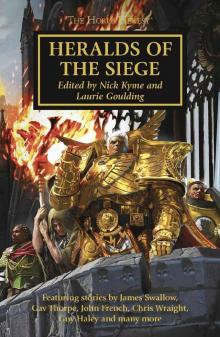 Heralds of the Siege
Heralds of the Siege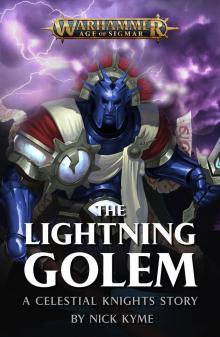 The Lightning Golem
The Lightning Golem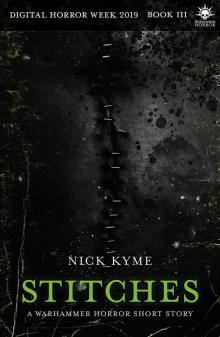 Stitches
Stitches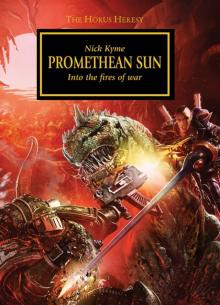 Promethean Sun
Promethean Sun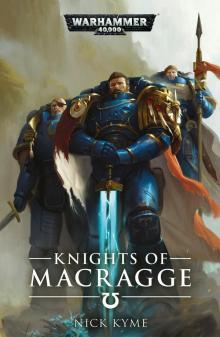 KNIGHTS OF MACRAGGE
KNIGHTS OF MACRAGGE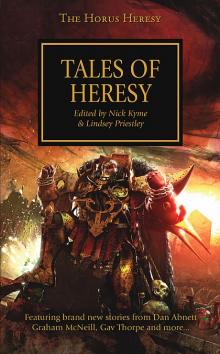 Tales of Heresy
Tales of Heresy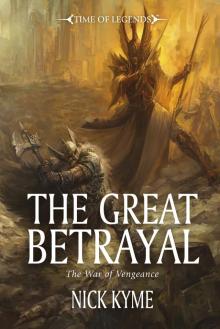 The Great Betrayal
The Great Betrayal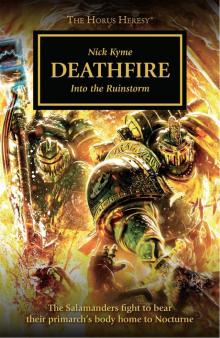 Deathfire
Deathfire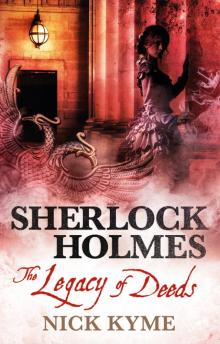 Sherlock Holmes--The Legacy of Deeds
Sherlock Holmes--The Legacy of Deeds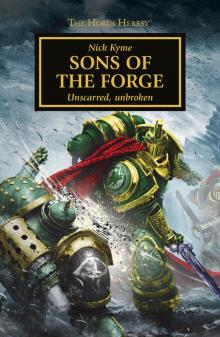 Sons of the Forge
Sons of the Forge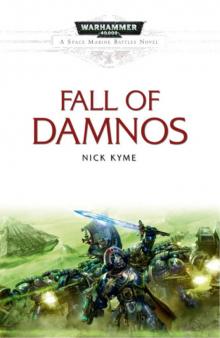 Fall of Damnos
Fall of Damnos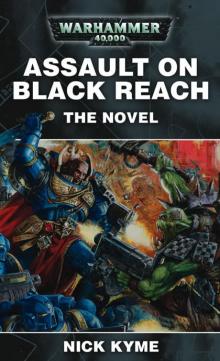 Assault on Black Reach: The Novel
Assault on Black Reach: The Novel![[Horus Heresy 10] - Tales of Heresy Read online](http://i1.bookreadfree.com/i/03/27/horus_heresy_10_-_tales_of_heresy_preview.jpg) [Horus Heresy 10] - Tales of Heresy
[Horus Heresy 10] - Tales of Heresy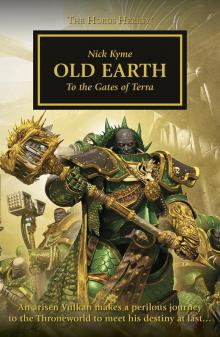 Old Earth
Old Earth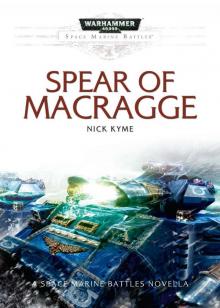 Spear of Macragge
Spear of Macragge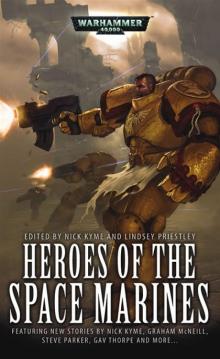 Heroes of the Space Marines
Heroes of the Space Marines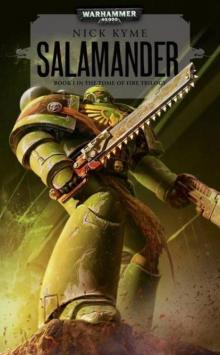 Salamander (warhammer 40000)
Salamander (warhammer 40000)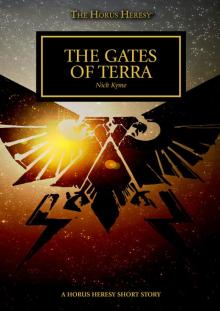 The Gates of Terra
The Gates of Terra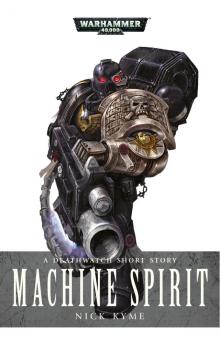 Machine Spirit
Machine Spirit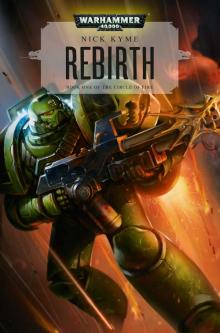 Salamanders: Rebirth
Salamanders: Rebirth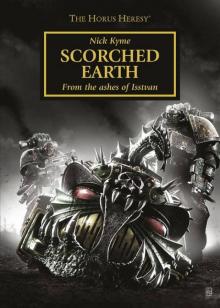 Scorched Earth
Scorched Earth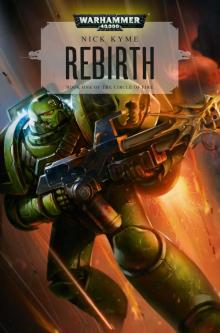 Rebirth
Rebirth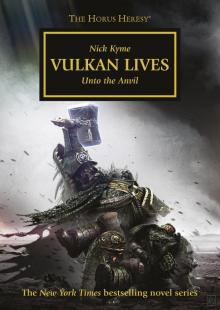 Vulkan Lives
Vulkan Lives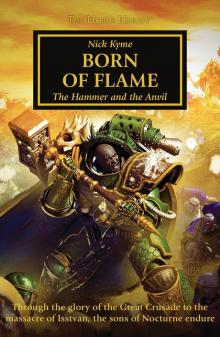 Born of Flame
Born of Flame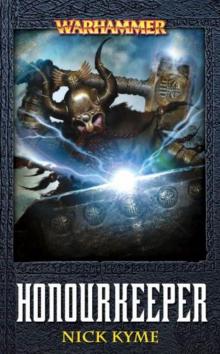 Honourkeeper
Honourkeeper